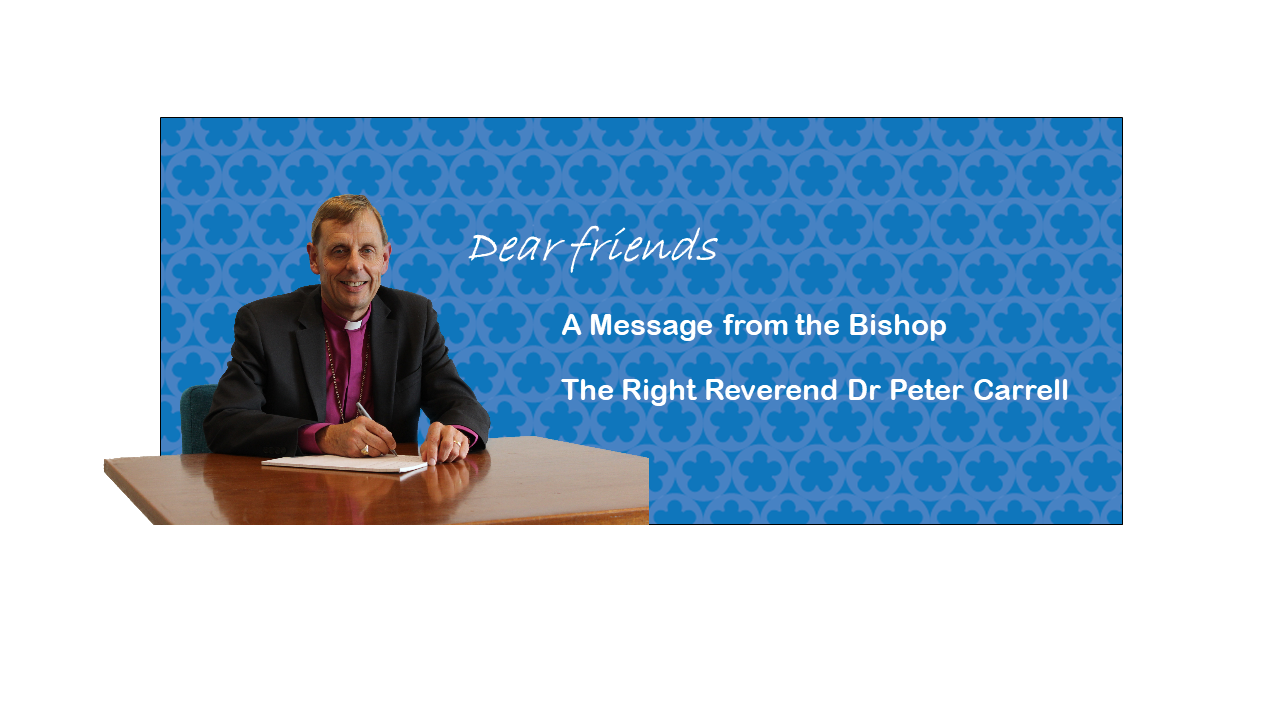
Dear Friends,
It was lovely on Monday to visit the pre-ordination retreat being held for those to be ordained at our end of year ordination service – Matt Maslin, Jo Cotton and Sammy Mould as deacons, and the Reverend Dr Andrew Butcher as priest. This takes place this Saturday, 25 November – 10.30am in the Transitional Cathedral – clergy please robe, red stoles. Our preacher will be the Reverend Chris Darnell, Vicar of Whitby, Diocese of Wellington. All welcome.
The Installation of our new Dean, the Reverend Canon Ben Truman, will be at 7pm on Wednesday, 29 November in the Transitional Cathedral. All welcome. Clergy are invited to robe, red stoles. (Clergy, please RSVP re seating, to Chris Oldham). Our preacher will be Archdeacon Mark Barlow, Vicar of Lincoln, Archdeacon of Irakehu and Vicar-General of our Diocese. Please pray for all named above preparing for ordinations this weekend, and for Ben as he prepares for his installation.
Last Saturday and Sunday Teresa and I were involved, along with others from our Diocese, in significant events for Te Hui Amorangi o Te Waipounamu. At 10am on Saturday morning we were present for the opening of Te Tomairangi o Ihu Karaiti – opened by Archbishop Don Tamihere and Bishop Richard Wallace at Te Pā Mihinare o Waipounamu, 290 Ferry Road, Christchurch. On Sunday morning we shared in the reconsecration of newly restored Tokotoru Tapu (Holy Trinity Church), Arowhenua, and in the ordination to the priesthood and installation of its Kaitiaki Minita Mihana, the Reverend Wendy Heath. The significance of the participation of Archbishop Don Tamihere, Te Pihopa o Aotearoa, in the re-consecration of this church was that in 1931, his predecessor, Pihopa Frederick Bennett, conducted the first consecration of this church.
The service held in Tokotoru Tapu was the first held there for many years since the church was closed because of quake damage and borer disintegration of the floor. After the service there was a powhiri and hakari in the whare of the Arowhenua marae. The meaning of the name of this whare is, “The Broken Promises of the New Zealand Government” – a title expressive of the many years through which Ngai Tahu sought a comprehensive settlement from the Government, a journey which led to the Ngai Tahu Settlement Act 1996 (see further).
Advent this year begins on Sunday, 3 December – elsewhere in e-Life we advertise the Advent Carol Service to be held in the Transitional Cathedral that evening. If Advent begins late this year, then Lent begins early next year – Wednesday, 14 February – and work on Theology House’s 2024 Lenten Study A Future of Hope is well under way. Continuing the work to help the Church adopt a posture from which to respond meaningfully to the work of the Royal Commission on Abuse in Care, the study explores ideas such as apology, forgiveness, and justice. As suggested by the title, there is a focus on how we will live together in Christian community into the future and answer the call to love our neighbour. For more information or for advanced order enquiries, please email Theology House.
Gaza/Israel/West Bank: As I write this afternoon a proposed temporary ceasefire in exchange for the release of hostages seems to be imminent. Let’s keep praying for a ceasefire which is part of a definitive, committed pathway to a just and lasting peace. Reading Ephesians 2:11-18 this week has reminded me that the truest, most permanent peace comes through Jesus Christ, who died on the cross to breakdown hostility between warring groups of people. A just and lasting peace between any two groups of people at odds with each other must be based on coming together at the foot of the cross of Christ, sharing in recognition that the purpose of life is fulfilled in human unity and not in division and comes into reality through shared acknowledgment that God loves all, without division and forgives all without weighing our respective merits.
Our Gospel reading this coming Sunday, Ordinary 34 or Christ the King/The Reign of Christ, is Matthew 25:31-46, often known as the Parable of the Sheep and the Goats. In the reading of this parable, whom do we see ourselves as? Sheep? Goats? Vulnerable persons who are seen and cared for? Vulnerable persons who are not seen and not cared for? As readers of this parable, what might become different in our lives?
Hopefully we have a new and well stitched together Government by the end of tomorrow. Will the deal being worked on enable the people groups of this land, especially Māori and Pakeha, to draw together in harmony? What will offer hope to the vulnerable people of our society? Will love increase in our communities? What new policies will the deal offer towards Aotearoa New Zealand becoming a just society?
Arohanui,
+Peter
